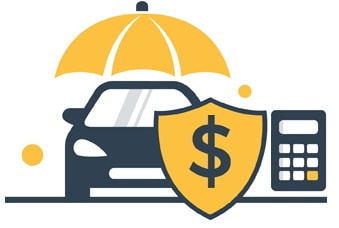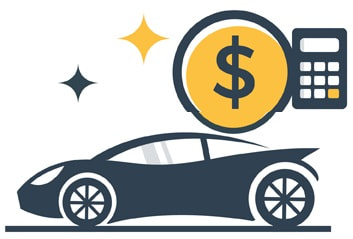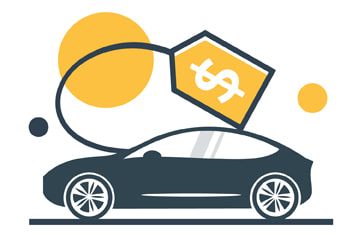Free Car Valuations – Determining Your Car's Value and What You Can Do to Maximise It
Find out a car's value in seconds with two trusted and free tools. Our guide explains everything you need to know to maximise a car's resale value.
Updated 9 May 2024
Summary
In this guide, we outline how to get accurate valuation(s) for a car, and how to protect and maximise the value while you own it. Our guide covers:
Know This First: When do you Need to Know or Use your Car Valuation?
- Knowing your car's value is vital information. Whether you're buying a car, insuring a car, or selling a car, what's most important is its value. This will affect how much financing you get, how much your insurance costs, or how much you can sell your car for later on.
- Avoiding the common mistake of overpaying for a car can be avoided the more informed and resourced you are.
- We believe many New Zealanders hold on to under-performing cars because of the time and costs associated with selling a car, and the uncertainty around its valuation. This guide has been published to bring transparency to finding out how much a car is worth.
In this guide, we outline how to get accurate valuation(s) for a car, and how to protect and maximise the value while you own it. Our guide covers:
- Tools and Resources to Value Your Car
- What Affects a Car’s Value?
- 10 Ways to Keep your Car in Great Condition and Maximise its Value
- Car Valuations - Frequently Asked Questions
Know This First: When do you Need to Know or Use your Car Valuation?
- Selling your car: This is the most common reason you may need a car valuation. You want to ask the right price for the car if selling it privately and to know you're getting enough for it if you trade it in. Knowing its valuation helps you price it and negotiate a price with potential buyers.
- Buying a car: Before you buy a car, you should know its worth independently of the seller's price. If you don't, you could pay too much for the car or negotiate too low and lose the deal. The car valuation helps you understand the price you should pay, and gives you independent resources you can use to help you negotiate.
- Buying or renewing insurance: You should know a car's value so you buy the right amount of insurance. There's no sense in buying too much insurance – it's a waste of money. But if you don't buy enough insurance, you could be on the hook for the difference between what your insurance pays and the cost of damages, which could be financially destructive.
|
Christopher Walsh
MoneyHub Founder |
MoneyHub's Top Car Finance Options - Avoid high interest rates and fees with our trusted lenders.
|
Our Three Trusted and Affordable Car Lenders Committed to Fast Quotes:
Tools and Resources to Value Your Car
If you're buying or selling a car, there are several options beyond our trusted tool. We outline these below:
1. Our trusted tool with live data and value graphs
2. Alternative free and paid online tools
Websites such as Trade Me Value My Car and BestCar provide a basic valuation of your car, based on its make, model, year, mileage, and condition you think it's in. This may not match what a professional appraiser values your car for, but you'll get a general estimate. CamJam,co.nz, most commonly used as a vehicle background report service.
Trade Me's Value My Car Tool (Free Service)How does it work? Trade Me takes prices from over 3,000 car dealers and 150,000 private sellers to calculate a price range based on your car’s specific model even down to the variant. You'll need to input the mileage to get the most accurate value range. Trade Me states that it updates its data daily to ensure it reflects the sort of price you could expect to get right now. The suggested price range Trade Me displays is to help car owners (and buyers) factor in the car's condition and features and make a judgement on where the price should be.
For example, using the Trade Me tool, a 2000 Peugeot 206 has a $1,500 (low) to $4,000 (high) range, with a 'medium' price of $2,600. If the condition of one car is excellent and it has been well cared for, the value could be in the higher range. Conversely, a model with a few scratches, broken radio, worn-out seats etc would likely be sold in the lower range. More details: Trade Me Value My Car |
BestCar.co.nz Car Valuation Tool (Free Service)How does it work? BestCar is powered by OptiFleet, an online vehicle sourcing platform. BestCar uses OptiFleet's vehicle datasets and industry intelligence to provide a 'residual value' car price. This valuation is derived from computer modelling based on sales data. If you know the odometer reading you can enter it, otherwise, the report uses the last odometer reading from NZTA.
Using the example of a 2000 Peugeot 206, BestCar.co.nz estimated the sales range between $1,150 and $1,400 with an estimated value of $1,250. More details: BestCar |
Carjam.co.nz Car Valuation Tool (Paid Service)How does it work? Carjam charges $4.95 for a car valuation report which also includes an odometer history that shows WOF pass/fails, import history and damage records.
Using the example of a 2000 Peugeot 206, Carjam's report estimated the value of $7,600, an amount well outside of the range suggested by both Trade Me and BestCar.co.nz. However, this is one example - if you're buying or selling, a fee of $4.95 may be worthwhile to have more evidence to help you determine a fair valuation. More details: CarJam.co.nz and our CarJam Review and CarJam vs MotorWeb Reports |
3. Visit a dealer/trade-in car yard
If you're planning to trade in your car with a dealer or auction house, they can tell you what they'd give you for the car. Generally, the 'value' may be discounted, so it's essential to have other quotes (i.e. sourced online), so you know the ballpark figure. An example includes Turner's Cash Now service (please note, a Turners consultant must see the vehicle in-person before an offer can be made).
4. Independent appraiser
You can hire an independent appraiser to value your car. This is the most unbiased opinion you'll get about your car's value. The appraiser doesn't 'win' if he values it low like a dealer would or have anything to gain by overvaluing the car. Examples include:
- Tower Insurance - Tower's list of experts covers Auckland, Hamilton, Tauranga, Rotorua, Napier, Palmerston North, Wellington and Christchurch
What Affects a Car’s Value?
There may be some variation in what a person or company uses to value your car, but in general, these factors affect a car's value:
Know This: Car owners generally don't have much influence as to the value of their vehicle, but there are ways you may improve a car's value.
- Car manufacturers - Some car makes are more valuable than others when you buy them, so there are different prices. But each car holds value differently. Some keep their value while others fall faster. Our guide to cars that hold their value has more details.
- Car model – Just like the manufacturer, the car model matters too. Just because Toyota's (generally) keep their value, for example, doesn't mean every Toyota model does.
- Age – Older cars generally have a value lower than newer cars. It depends mainly on the two factors above too. Certain years have better values too. It depends on the features and technology out at the time the car was manufactured.
- Mileage – Your car's valuation depends on the total number of kilometres compared to the car's year. The average person drives 8,000 – 12,000 km per year, so use that as a basis. If you have a car that's five years old, it should have on average 40,000 km – 60,000 km. If it has a lot less, it may have a higher value, and a lot more would drop its value.
- The car's exterior – Just like a house, people make their first opinion about a car looking at its exterior. Cars without scratches and dings will be worth more than cars with them: the paint colour and overall appearance of the car's exterior matter too.
- The car's interior – How well you maintain the interior plays a role in the car's valuation. Are the seats in good condition, or are they ripped and scratched? Is the dashboard in good condition? Does the car look well maintained?
- Service history – How well you maintain the car also plays a role in its value. If you kept up with the car's maintenance, it should be in good working condition, reflecting in its value. If you skipped regular maintenance needs, though, it could cause excessive wear and tear on the car and decrease its value.
- Features – If you made after-market changes to a car or upgraded its features, it could increase the car's value. But it's not guaranteed and certainly not a proven investment.
Know This: Car owners generally don't have much influence as to the value of their vehicle, but there are ways you may improve a car's value.
10 Ways to Keep your Car in Great Condition and Maximise its Value
Maintaining a high resale value is easier when you make easy-to-follow car care tips a habit. We list the ten easiest and most effective below.
Keep it CleanKeeping your car clean has a lot to do with its condition, and routine cleaning helps maintain its value.
What to do:
|
Get Scratches and Dings Touched Up Right AwayAbrasions on a car happen frequently - someone opens a door into your car, you walk too close to it in the garage and scratch it, or someone hits your car getting out of a park.
Whatever the case may be, the bottom line is scratches and dings weaken the car's exterior. Leaving it be lets rust set in, which decreases the car's resale value. What to do:
|
Keep up with MaintenanceYour car comes with a maintenance schedule for a reason. Few drivers follow it, but the manufacturer provides them to help owners protect their asset.
If you skip oil or other fluid changes, spark plug replacement, and other basic (and sometimes not so basic) maintenance tasks, you damage the car's engine. What to do:
|
Watch the Mileage"Too much mileage" is a problem if you drive a lot and are looking for good resale value. If you drive more than the norm, around 15,000 km per year, consider selling the car early. For example, if you plan to keep a car for five years but usually average driving 25,000 km per year, your odometer would be 125,000 km when you try to sell the car. This immediately lowers its resale value.
What to do:
|
Keep it CoveredMany people leave their car outside and expose it to rain, sleet, dirt, sand and debris, which all damage your car. If it's left outside often, it is almost certain to have more damage than if you leave it covered.
Even leaves or rain can damage your car. It weakens the paint, and if you let the car sit unwashed for many months, the damage happens even faster. Sand is the air is an issue around coastal areas. |
Keep it Shiny and FunctionalWashing your car eliminates debris, but waxing it gives the paint a look outlook on life. Every couple of months, use wax to get a new shine. At the same, you can check the car's other functions. Are all lightbulbs working? Dim headlights may not seem like a value killer, but they are – they make the car look dingy. Wash the lights first and if that doesn't solve the issue, replace the bulbs.
|
Take Care of the TyresNew Zealanders often overlook tyres and drive with imbalanced pressure, which can accelerate mechanical issues.
What to do:
|
Respond to Engine and Dashboard LightsEngine lights are there as a warning and make you aware of an issue. There's not an alert to tell you your car is a lemon. No matter how well you maintain your car, anything can happen.
What to do:
|
Watch Where You ParkWe've all been there, you park in the last spaces in the car park, many spaces aware away from everyone only to come out and find someone has dinged you. It's frustrating, and only honest drivers leave a note with their details.
What to do:
|
Oil Spray Underneath the CarFew drive owners think about (or look) at the bottom of their car, but that's where the wear and tear occur next to the engine. The undercarriage takes a beating when you drive. It's subject to the dirt and debris on the road.
What to do:
|
|
Christopher Walsh
MoneyHub Founder |
MoneyHub's Top Car Finance Options - Avoid high interest rates and fees with our trusted lenders.
|
Our Three Trusted and Affordable Car Lenders Committed to Fast Quotes:
Car Valuations - Frequently Asked Questions
Car values don't follow any rules, but to help give some clarity we have listed popular queries below.
Can a car’s colour affect its value?
If your car is a non-traditional colour or a colour that buyers don't want right now, it could affect its value negatively. However, if it's a trending colour that buyers want, it may increase its value. The New Zealand car market is largely unresponsive to trends, but it's best to think about resale potential when deciding on a colour.
Can a car with no cosmetic damage be worth more?
Cosmetic damage plays a larger role in a car's value than most people realise. Generally, if your car has no cosmetic damage, it may be worth more than a car with cosmetic damage (of the same make and model).
Do extra features increase a car’s value?
It depends generally that only some features may increase a car's value, but there is no guarantee. If you make after-market changes, make them because they are something you want, regardless if you see a return on your investment.
Can an unknown service history really hurt a car’s value?
Yes - typically, the next owner will want to know the car's maintenance history. If you can't prove that the car was properly maintained, it affects its value negatively. Keep careful track of how you care for the car with official receipts with dates on them so the next buyer knows the car's condition. The more information you have, the more responsible you appear to be as an owner.
If a car has had a lot of previous owners, does it hurt its value?
It depends. Arguably, too many owners could hurt your car's value as it's implied there are inherent problems (i.e. it's a problem car). There's no set number of 'acceptable' owners for a car's value, but excessive ownership often means more wear and tear and more difficulty in tracking down a car's maintenance history.
Does market demand affect a car’s value?
Yes, but New Zealand's used car market doesn't see significant swings or trends. However, if you have a car that many people don't want or that's hard to sell, both of these factors will likely decrease its value.
Why does low mileage increase a car’s value?
Low mileage means a few things:
- There were probably only one or two owners beforehand, which is a positive signal that the car is reliable.
- If you didn't drive excessively, the car is probably in great condition, and there won't be as much maintenance to track. The better condition a car is in, the more it will be worth.
Driving and Car Care Guides
Car Finance and Insurance Guides:
- CarJam Review and CarJam vs MotorWeb Reports
- The Ultimate Guide to Buying a Used Car in New Zealand
- Cheaper Driving Costs
- Warrant of Fitness
- Affordable Car Service Mechanics in Auckland, Tauranga, Hamilton, Wellington, Lower Hutt, Christchurch and Dunedin
- Our Top Panel Beaters & Smash Repairs in Auckland, Tauranga, Hamilton, Wellington, Lower Hutt, Christchurch and Dunedin
Car Finance and Insurance Guides:




























